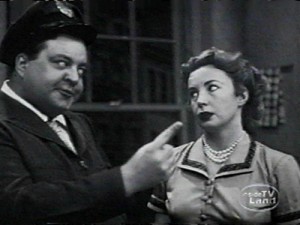Joinder of Non-Owner Spouses in New Jersey Residential Foreclosure Cases
 Assume the following scenario: Ralph Kramden purchases a residential investment property while single, and obtains mortgage financing to fund the purchase price. The property Deed is in Ralph’s name only, as are the mortgage and promissory note that Ralph signed in favor of the bank. A few years later Ralph marries Alice. Despite Ralph’s many promises that he’ll send Alice “to the moon,” or at least escape their tiny apartment in Brooklyn, he never adds Alice to the Deed and they never occupy the property as their marital residence.
Assume the following scenario: Ralph Kramden purchases a residential investment property while single, and obtains mortgage financing to fund the purchase price. The property Deed is in Ralph’s name only, as are the mortgage and promissory note that Ralph signed in favor of the bank. A few years later Ralph marries Alice. Despite Ralph’s many promises that he’ll send Alice “to the moon,” or at least escape their tiny apartment in Brooklyn, he never adds Alice to the Deed and they never occupy the property as their marital residence.
Ralph and Alice are unable to maintain the mortgage payments on this investment property. Alice pleads with Ralph to sell the property, but Ralph is too stubborn and lets the mortgage default. The bank files a foreclosure suit naming both Ralph and Alice as defendants. Alice had perfect credit when she married Ralph. Now Alice is concerned that her credit may be damaged.
Is there a basis to dismiss the wife from the foreclosure suit? Yes. Under applicable New Jersey law, when a property is not used as principal marital residence the lender is not required to join as a defendant the spouse whose name neither appears on the Deed or mortgage. So if Ralph and Alice never occupied this investment property as their marital residence then there is no basis for the bank to sue Alice in order to foreclose the mortgage because Alice has no possessory interest in the property.
On the other hand, if a husband and wife ever occupied the property as their principal marital residence then the bank is required to name the non-owner spouse (in this example Alice) as a defendant in the foreclosure suit in order to extinguish that spouse’s possessory interest in the marital home. This is true even if the husband purchased the property before the couple’s marriage and the wife never signed the mortgage. Once a home becomes occupied as the principal marital residence, the wife’s possessory rights attach and she must be joined as a defendant in a foreclosure suit in order for the lender to extinguish her possessory right.
But lenders are often not privy to a change in their borrower’s marital history. Thus, it is common practice for lenders to name both husband and wife in residential mortgage foreclosures, based on the assumption that the couple has occupied the home as a marital residence. An innocent spouse who is joined in a foreclosure suit may suffer adverse reporting on his or her credit report. In these limited circumstances, it may be prudent for the innocent spouse to file a motion to dismiss the lender’s foreclosure complaint. Below is a discussion of the relevant statutes and case law that should be cited to the foreclosure court when filing such a motion.
 Dower and Curtesy Abolished in New Jersey
Dower and Curtesy Abolished in New Jersey
A widow’s share for life of her husband’s estate is known as “dower.” A husband’s interest at common law in a life estate upon the death of his wife in real property that she either solely owned or inherited is known as “curtesy.”
Dower and curtesy were abolished in New Jersey by N.J.S.A. 3B:28-2 effective May 28, 1980 as to real estate included in a widow’s elective share under N.J.S.A. 3B:28-1 or the principal marital residence in which a spouse has a right of joint possession under N.J.S.A. 3B:28-3.
Where no dower or curtesy applies, a husband and wife who occupy property as their principal marital residence each has a right of joint possession that can be extinguished only under any one of the following circumstances:
- the consent of both parties;
- the death of either spouse;
- judgment of divorce, separation or annulment;
- other order or judgment which extinguishes same; or
- voluntary abandonment of the principal marital residence.
N.J.S.A. 3B:28-3(c). The right to joint tenancy, conferred by N.J.S.A. 3B:28-3 “was enacted concurrently with the repeal of dower and curtesy.” Arnold v. Anvil Realty Inv., Inc., 233 N.J. Super. 481, 484, (App. Div. 1989)). The statute confers a right, which is “more substantial than a mere right to live in the marital dwelling.” Id. at 486.
N.J.S.A. 3B:28-3.1 identifies a limited number of scenarios where the right of “joint occupancy of principal matrimonial residence” is deemed subject to a mortgage lien. In any of these circumstances both husband and wife must be named as defendants in a suit to foreclose upon the “matrimonial residence” even when only one of them are the title holder and mortgagor:
- The mortgage is placed upon the matrimonial residence prior to the time that title to the residence was acquired by the married individual; or
- The mortgage is placed upon the matrimonial residence prior to the marriage; or
- The mortgage is a purchase money mortgage; or
- The parties to the marriage have joined in the mortgage; or
- The right of joint possession has been subordinated, released or extinguished by subsection b. or c. of N.J.S.3B:28-3.
N.J.S.A. 3B:28-3.1 (a) – (e)(emphasis added). These requirements apply only if the property is occupied as the “matrimonial residence.” If any one of the above circumstances exists, the lender is required to name both husband and wife in a mortgage foreclosure suit.
“Under the statute, no matter which spouse holds the legal title, when once, as married persons, they together occupy property as their principal marital residence, both have a right to the continued possession of it so long as their marriage endures and neither can affect the right of possession of the other without consent, except by judgment by a court of competent jurisdiction.” Pelow v. Pelow, 300 N.J. Super. 634, 642 n.4, (Ch. Div. 1996)(emphasis added). A mortgagee who accepts a mortgage from the spouse in sole title of the marital residence without securing the non-titled spouse’s signature does not have the ability to resort to a foreclosure suit to extinguish the non-titled spouse’s possessory rights. See Wamco XV Ltd. v. Farrell, 301 N.J. Super. 73 (App. Div. 1997)(The Appellate Division affirmed the granting summary judgment in favor of non-titled spouse, holding that her possessory interest in the marital residence was superior to the lender’s mortgage. The lender granted the husband a mortgage on the marital residence without securing the second wife’s signature on same, even though the lender knew the borrower was married).
For questions about this article or New Jersey foreclosure law and procedures, contact us to discuss your case.
Tagged in: Bergen County foreclosure attorneys, Bergen County foreclosure lawyers, curtesy, curtesy NJ, dismissing foreclosure complaint NJ against non-owner spouse, Dower, Dower NJ, enforcing mortgage against property owner prior to marriage NJ, foreclosure, foreclosure NJ marital residence possessory rights non-owner spouse, foreclosure NJ principal matrimonial residence, foreclosure of possessor rights in marital residence NJ law, Hackensack foreclosure attorneys, Hackensack foreclosure lawyers, N.J.S.A. 3B:28-3, New Jersey foreclosure defense attorneys, NJSA 3B:28-1, NJSA 3B:28-3, possessory rights marital residence NJ, possessory rights of non-debtor spouse, possessory rights of non-owner spouse NJ, real estate foreclosure against spouse who didn't sign mortgage NJ, suing spouse whose name is not on mortgage NJ

 Assume the following scenario: Ralph Kramden purchases a residential investment property while single, and obtains mortgage financing to fund the purchase price. The property Deed is in Ralph’s name only, as are the mortgage and promissory note that Ralph signed in favor of the bank. A few years later Ralph marries Alice. Despite Ralph’s many promises that he’ll send Alice “to the moon,” or at least escape their tiny apartment in Brooklyn, he never adds Alice to the Deed and they never occupy the property as their marital residence.
Assume the following scenario: Ralph Kramden purchases a residential investment property while single, and obtains mortgage financing to fund the purchase price. The property Deed is in Ralph’s name only, as are the mortgage and promissory note that Ralph signed in favor of the bank. A few years later Ralph marries Alice. Despite Ralph’s many promises that he’ll send Alice “to the moon,” or at least escape their tiny apartment in Brooklyn, he never adds Alice to the Deed and they never occupy the property as their marital residence. Dower and Curtesy Abolished in New Jersey
Dower and Curtesy Abolished in New Jersey